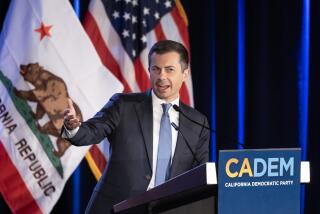Substance Takes a Back Seat at Modern Conventions
- Share via
Sporting none of the yachting, golfing and hobnobbing of this week’s Republican National Convention in San Diego, American political conventions in past times were often grueling marathons in which delegates struggled mightily to decide which candidates and ideas should guide the country. The Democrats’ 1924 convention, for example, required 103 separate ballots to arrive at a consensus on a candidate and a platform.
This week, by contrast, presidential candidate Bob Dole said he had not even bothered to read his party’s platform. And on Aug. 26, when the Democrats begin their festivities in Chicago, buoyant celebrations of unity behind Bill Clinton are expected to conceal virtually all controversy.
Yes, many Americans have been inspired by the ebullient San Diego convention, for Dole’s approval ratings have risen sharply since it began. But the unparalleled number of private dollars used to underwrite the gathering (the Republicans raised $11.2 million, compared to $4.3 million in 1992) has led many students of the political process to wonder: Should we continue to let our national conventions devolve into little more than opportunities for cheerleading and fund-raising?
Michael Beschloss and other historians point with some favor to the conventions of yesteryear that gave “unpledged” delegates an opportunity to consider issues more thoroughly than most individual voters, and less parochially than state caucuses.
Without such delegate debates the United States might have lost some of its sharpest political thinking. Had Abraham Lincoln not been given the chance to unhorse the less visionary Republican front-runner William H. Seward on the third ballot in 1860, the Civil War may have ended differently. And had William Randolph Hearst, who dominated the California delegation, not been able to throw his support on the fourth ballot to Franklin Roosevelt at the 1932 Democratic Convention, the president who dealt with the Depression and Hitler might well have been either Al Smith or John Nance Garner.
Since 1956, however, nominations have come to depend on delegates bound to specific candidates chosen directly by the voters in state primaries, caucuses and conventions. Vice presidential selections have been rubber-stamped and, after the conventions, party platforms increasingly forgotten.
Cries for more substance and less show have been heard frequently in the last few decades. They are particularly strident now because this year’s conventions have let monied Americans purchase access to power more openly than ever before.
A $15,000 contribution to the Republican Party, for instance, lets you fly through San Diego as a “Republican Eagle,” guaranteed a host of perks ranging from a visit with Newt Gingrich to an exclusive ride on the yacht Stars and Stripes. The Democratic National Committee extends similar perks to its “managing trustees,” party members who have raised or contributed $100,000 or more. In contrast, only one-quarter of 1% of Americans donated more than $200 to a political group in the 1994 elections.
Laws passed after Watergate in 1974 were supposed to have obviated the need for private money by earmarking federal funds for political conventions (currently, the Democrats and the Republicans get $12.4 million each in government money). But loopholes are being increasingly exploited. The IRS’ 501C3 tax exemption, for instance, is being used by some wealthy individuals and private corporations to gain the same write-off for contributing to a political convention that others get for giving money to organizations such as the Salvation Army.
A final problem is a recent set of Federal Election Commission decisions. In addition to removing the cap on contributions individuals can give to conventions, they have allowed any company selling its products or services within the limits of a host city to contribute to a convention’s host committee. Previously, largess could be accepted from only locally based companies.
Tightening or eliminating but a few of these loopholes could slow the surge of private money and influence into national convention coffers. But given the understandable distrust most Americans have of deals struck in smoky back rooms, does the answer lie in returning to the laborious conventions of long ago, when delegates were obliged to put contemplation ahead of celebration? The Democratic and Republican parties, which have come to cash in handsomely on the current system, would resoundingly answer no.
More to Read
Get the L.A. Times Politics newsletter
Deeply reported insights into legislation, politics and policy from Sacramento, Washington and beyond. In your inbox twice per week.
You may occasionally receive promotional content from the Los Angeles Times.









